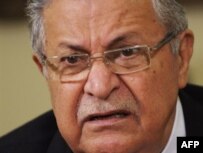Iraqi president rejects provincial elections law
| Publisher | Radio Free Europe/Radio Liberty |
| Author | Reuters |
| Publication Date | 24 July 2008 |
| Cite as | Radio Free Europe/Radio Liberty, Iraqi president rejects provincial elections law, 24 July 2008, available at: https://www.refworld.org/docid/4889d088c.html [accessed 23 May 2023] |
| Disclaimer | This is not a UNHCR publication. UNHCR is not responsible for, nor does it necessarily endorse, its content. Any views expressed are solely those of the author or publisher and do not necessarily reflect those of UNHCR, the United Nations or its Member States. |
July 24, 2008
By Reuters
 Iraqi President Jalal Talabani
Iraqi President Jalal Talabani
BAGHDAD – Iraqi President Jalal Talabani has rejected a provincial election law as unconstitutional after Iraq's Kurdish lawmakers boycotted the parliament session that ratified it.
The controversial law must now be subject to another parliamentary vote and pass by even greater majority, raising the prospect that elections scheduled to be held on October 1 may have to be delayed until 2009.
Iraq's parliament passed the bill on July 22 in the absence of Kurdish legislators who disagreed with provisions on how to handle voting in the disputed, multiethnic, oil-rich city of Kirkuk. Kurds make up one of three main parliamentary groups.
Talabani's three-member Presidency Council must ratify each law passed by parliament.
"The president, who is guided by the principle of consensus between the three factions [in parliament], cannot accept this law, which infringes that principle ... and violates the constitution," the statement said.
The elections will provide early clues on how Iraq's Shi'ite, Sunni, and Kurdish factions and other minority groups will fare in parliamentary elections, scheduled for 2009 – polls that will determine if Prime Minister Nuri al-Maliki himself will remain in power.
Fierce Power Struggle
Analysts say the polls will also be the battleground for a fierce power struggle among sectarian and ethnic parties that could redraw the country's political map.
Talabani, a Kurd, came under intense pressure from the Kurdish alliance to which he belongs not to ratify the bill.
"We call upon ... the president to confront these suspect projects that don't serve Iraqi agendas and aim at hindering the national democratic course," the government of Iraq's largely autonomous region of Kurdistan said in a statement on July 22.
The issue of Kirkuk has proved especially divisive, with a dispute simmering between Kurds who say the city should belong to the largely autonomous Kurdistan region and Arabs who want it to stay under central government authority.
Analysts say a bill without backing from the Kurds, who hold 58 of parliament's 275 seats, would not be seen as legitimate.
The law would have postponed voting in Kirkuk and it included an article carving out fixed seat allocations to each ethnic or sectarian group, so voting is between individual candidates from those groups. Kurds, Arabs, and Turkomans get 10 seats each. Minority Christians get two.
Kurds rejected these provisions and were also against a proposal to vote on them by secret ballot.
